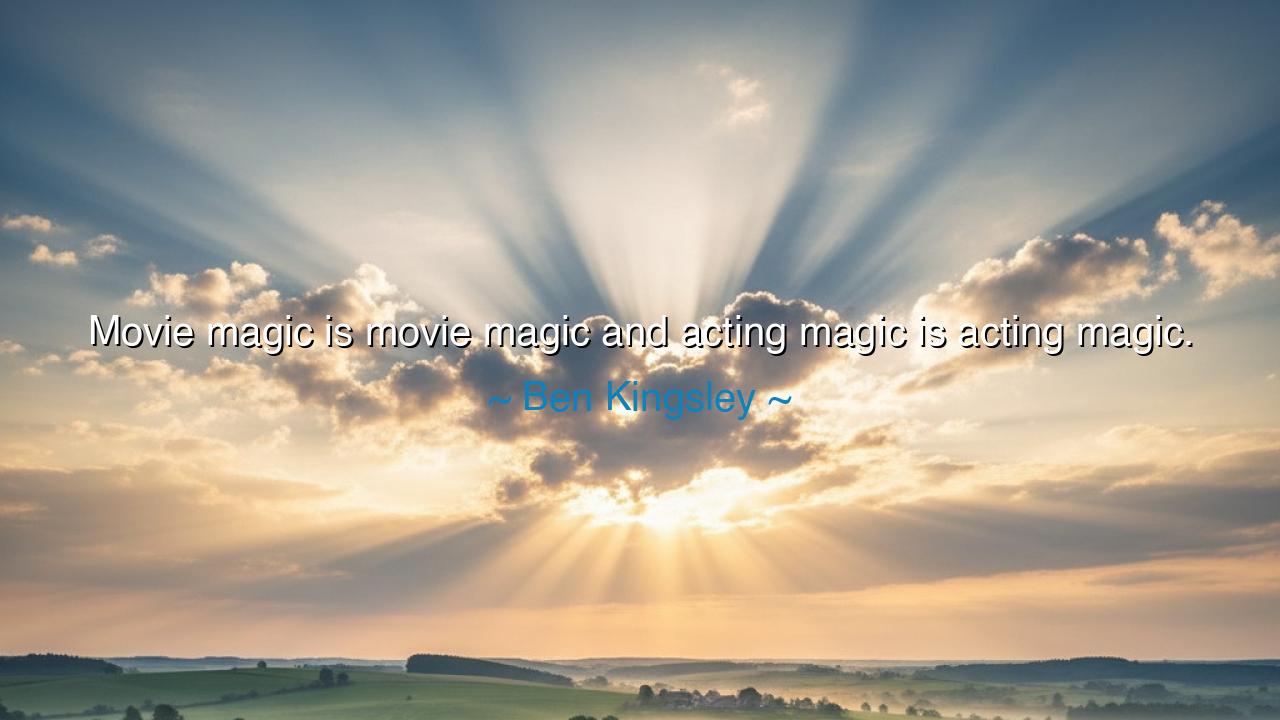
Movie magic is movie magic and acting magic is acting magic.






Hear the words of Ben Kingsley, master of craft and vessel of many souls, who declared: “Movie magic is movie magic and acting magic is acting magic.” At first, the words seem simple, like a riddle uttered by a sage. Yet within them lies a deep distinction, a wisdom forged from years of treading both stage and screen. Kingsley reminds us that the enchantment of cinema and the enchantment of the actor are two different powers. Each has its own alchemy, each its own truth. One belongs to light and machine, the other to flesh and spirit.
The meaning of this saying lies in the recognition that cinema is a marriage of many crafts. Movie magic is the spectacle of sound, image, editing, and invention—the vast machinery that makes a world appear real when it exists only as shadow and illusion. It is the magic of light painted across the screen, of armies conjured from nothing, of whole galaxies born in a studio. But acting magic is of another order—it is the trembling of a human voice, the flicker of an eye, the heartbeat of truth carried in the vessel of a single soul. The one dazzles; the other transforms.
Consider the film Gandhi, where Kingsley himself embodied the Mahatma. The movie’s grandeur—the re-creation of India, the thousands of extras in vast processions, the careful detail of history—was its movie magic. Yet what made the film immortal was Kingsley’s performance, the quiet dignity, the calm conviction, the intimate humanity he carried into every scene. That was the acting magic—the transformation of one man into another, so complete that audiences believed they saw Gandhi himself. Without the spectacle, the performance might have remained hidden; without the performance, the spectacle would have rung hollow.
This distinction echoes through the ages of storytelling. When Shakespeare’s plays were first performed, there were no machines, no grand illusions, only words and actors. Yet audiences were transported to kingdoms, battlefields, and enchanted forests. The stage was bare, but the acting magic was enough to conjure worlds. In time, with cinema, came the power to summon dragons, to recreate history, to bend time and space. Yet still, if the actor’s truth is absent, the illusion collapses. The greatest films are born where both magics meet in harmony.
Kingsley’s words also carry a caution. Too often, we mistake one kind of magic for the other. We are dazzled by spectacle—explosions, effects, grand landscapes—and forget that it is the human soul that gives meaning to the image. Conversely, we may exalt an actor’s craft but forget the unseen army of editors, cinematographers, designers, and technicians who create the world in which the performance breathes. To confuse the two is to dishonor both. To recognize them as separate is to honor the sacred labor of each.
The lesson for us is clear: in all acts of creation, discern the kinds of magic at work. When you marvel at beauty, ask whether it is the craft of the environment or the spirit of the performer that moves you. Learn to see both. And in your own life, remember: there is magic in what surrounds you—the opportunities, the tools, the stage upon which you stand—but there is also magic within you, the truth of your being, your words, your choices. Greatness is born when inner magic and outer magic work together.
So, children of tomorrow, let this wisdom be your guide: honor both the stage and the player, both the illusion and the truth, both the movie magic and the acting magic. For life itself is much the same: the world provides its setting, its spectacles, its storms, but only you can bring to it the performance of the soul. And when the two meet—when circumstance and spirit are joined—then you will know the fullness of creation, and the true magic that endures.






AAdministratorAdministrator
Welcome, honored guests. Please leave a comment, we will respond soon